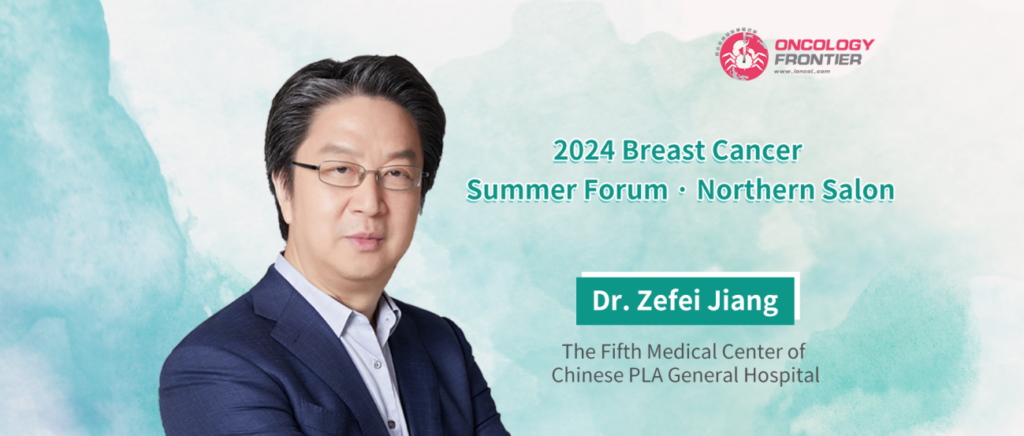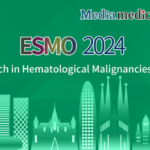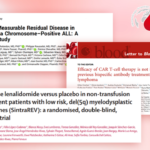
Editor's Note: On July 27-28, 2024, the "2024 Breast Cancer Summer Forum · Northern Salon" was grandly held at Beijing Shougang Park. The conference upheld the philosophy of "learning and innovation" and embraced the tradition of integrating ideas from "All directions, Throughout time and across the world, Across all seasons, People of all ages and genders." It delved into key issues in breast cancer, discussed the development prospects of innovative drugs in China, and offered an academic feast in the midsummer. "Oncology Frontier" conducted a special interview with the conference chairman, Dr. Zefei Jiang, to provide insights into the hot topics in breast cancer diagnosis and treatment.01
Oncology Frontier: As the chairman of the “2024 Breast Cancer Summer Forum · Northern Salon,” could you introduce the setup and highlights of the conference?
Dr. Zefei Jiang: The “Summer Forum · Northern Salon” is a traditional column with nearly twenty years of history. Its original intent was to use the weekend to sit around and discuss recent industry developments and hot topics, sharing valuable experiences. Every January, we revise the “CSCO BC Guidelines” and release them in April. As the industry evolves, different treatment approaches may have updated evidence, necessitating professional discussions on our platform to find optimization trends and encourage experts to conduct research. This provides more robust and reliable evidence for optimized strategies during annual reviews. At this conference, we also encounter new drugs and indications being approved. For example, we can discuss the journey of Toripalimab’s approval for triple-negative breast cancer (TNBC), covering its development, international reports, top journal publications, approval by the National Medical Products Administration, ongoing real-world clinical studies, and future impacts on clinical practice. Additionally, we aim to review the development of various breast cancer subtypes over the years, evaluating what problems we have solved, what issues remain, and what explorations should be undertaken.
02
Oncology Frontier: At this conference, you and Professor Yinhua Liu shared your thoughts on hot issues in internal and external breast cancer treatment. Could you explain the rationale behind this arrangement?
Dr. Zefei Jiang: In recent years, the industry has progressed rapidly, and treatments have become more standardized, but some hot issues remain contentious, even with opposing opinions. Patients might consider treatments used by top hospital experts as the standard, questioning other methods. Therefore, we hope experts from various regions can discuss optimization ideas for existing treatments. For instance, in surgery, we invited Professor Yinhua Liu to discuss whether to operate first or use medication, whether to biopsy with a needle or open surgery, and whether to “remove and rebuild” or “simply renovate” the breast, providing clinical references. Currently, tumor quality control is included in the “national exam” standards. Ensuring standardized breast cancer treatment within these standards requires careful consideration. In medical treatment, solving one problem often generates new ones. In the absence of conclusions, we hope to inspire industry thinking and discussions, allowing young experts to choose advantageous methods through dialogue and debate, providing reasonable medical options for the right patients at the right stage.
03
Oncology Frontier: Could you discuss the achievements and future directions of Chinese programs and original Chinese drugs in breast cancer?
Dr. Zefei Jiang: Breast cancer mainly includes three subtypes: HR-positive, HER2-positive, and triple-negative breast cancer. In the HR-positive field, we mostly relied on international products for over twenty years, focusing on introduction and imitation. In HER2-positive and other areas, we initially followed international developments before starting our innovations and development. In the past decade, especially in TNBC, scientific advancements and industry progress have allowed Chinese scholars to lead clinical trials of domestic original products, getting approvals even before international products entered the market. Therefore, Chinese doctors have the responsibility and confidence to use Chinese products based on Chinese trials, conducting Chinese research with Chinese wisdom to reach the international stage and change industry guidelines. Additionally, we can guide colleagues in “Belt and Road” countries, improving overall treatment levels and contributing to the health of our nation and humanity.
04
Oncology Frontier: Tomorrow’s agenda focuses on the HER2 target. Could you share your expectations for HER2 ADCs and the potential therapeutic innovations they might bring?
Dr. Zefei Jiang: Over the past twenty years, we have witnessed significant advancements in anti-HER2 treatments, with macromolecular targeted drugs, TKIs, and ADCs providing rich clinical options. Two decades ago, we participated in international clinical studies, such as early postoperative Trastuzumab adjuvant therapy, where 80% of our enrolled patients still survive today. In global anti-HER2 dual-target clinical studies, we contributed data for over 500 patients out of 4,800 globally. Nowadays, many international studies, like T-DXd first-line application trials, are co-led by Chinese and foreign experts, with China contributing over 25% of patient data. A year after T-DXd’s market release, we continue to follow its real-world clinical effectiveness, with over 200 applications in our center alone, even identifying some long-term benefit patients. New products bring new hopes for patients and inspire new research ideas, exploring early use, overcoming resistance, and combination strategies to provide more benefits for patients.
05
Oncology Frontier: The CSCO Annual Meeting will be held from September 25-29 in Xiamen. Could you preview the highlights and share any agenda items you are particularly looking forward to?
Dr. Zefei Jiang: We greatly appreciate the support from various media for CSCO’s work and attention to our annual meeting. The CSCO Annual Meeting will be held in late September in Xiamen. We will uphold our collaborative, practical style, following government and industry requirements, focusing on academic leadership to conduct a successful academic conference. We will invite national regulatory departments, government industry departments, and access departments to discuss China’s innovation development, market access, and how to benefit more patients. For example, we have invited Director Bi Jingquan, Academician Xue Tao, and other distinguished guests with dual roles as medical experts and industry leaders. We will invite renowned domestic and international industry experts to give academic keynote speeches, such as Council Chairman Xu Ruihua and other CSCO council leaders, reporting significant academic progress this year. We will also hold numerous themed sub-forums. The “Belt and Road” sub-forum has already received participation applications from many “Belt and Road” countries. The “same disease, different treatment; different diseases, same treatment” sub-forum will explore “different treatment” for various targets and new drug developments, and “same treatment” in mechanisms, treatment strategies, and safety management. This is the platform CSCO academic conferences provide for mutual communication and progress. We will also conduct the “Growing with CSCO” theme activity, inviting group member units, research and development units, and scientist representatives to share their stories of growing and developing with CSCO over the past twenty years. They will discuss how they contributed their wisdom and strength to CSCO’s development. On the other hand, CSCO will express gratitude to these group members and media units for their support over the years, conveying our pragmatic, modest, rigorous, and scientific style to the public and providing good service.
Dr. Zefei Jiang
Director of Oncology, Cancer Center of the General Hospital of the People’s Liberation Army Deputy Chairman of the Youth Expert Committee, Chinese Society of Clinical Oncology (CSCO) Member and Secretary-General, Oncology Expert Committee, Capacity Building and Continuing Education Center, National Health Commission Standing Member, Patient Education Expert Committee and Member, Breast Cancer Expert Committee, CSCO Member, Breast Cancer Professional Committee, Chinese Anti-Cancer Association (CBCS) Standing Member, Breast Disease Branch, Chinese Medical Health International Exchange Promotion Association Deputy Leader, Breast Cancer Diagnosis and Treatment Technology Promotion Group, China National Health Association Member, Breast Professional Committee, Chinese Research Hospital Association Deputy Chairman, Breast Health Science Popularization Expert Committee, Shanghai Science Popularization Volunteers Association Standing Member, Breast Cancer Expert Committee and Cancer Rehabilitation and Palliative Care Expert Committee, Shanghai Anti-Cancer Association Member, Breast Cancer Group, Surgery Branch, Shanghai Medical Association Class Leader, First Session of the Medical Star Plan, Shanghai Health Development Foundation Editorial Board Member of CA Chinese Edition and Chinese Medical Forum Oncology Edition Review Expert for Frontiers in Oncology, JNCC Youth Editorial Board Member, Chinese Journal of Oncology


